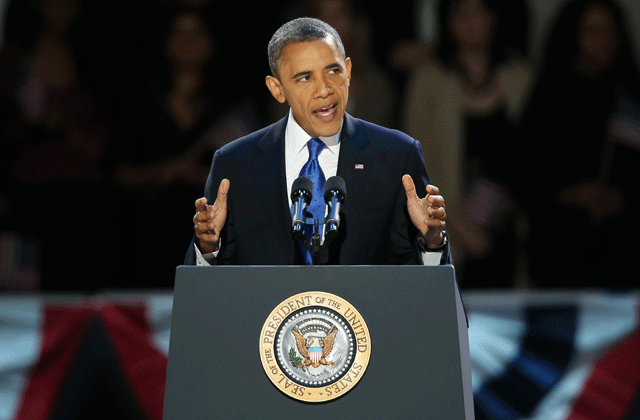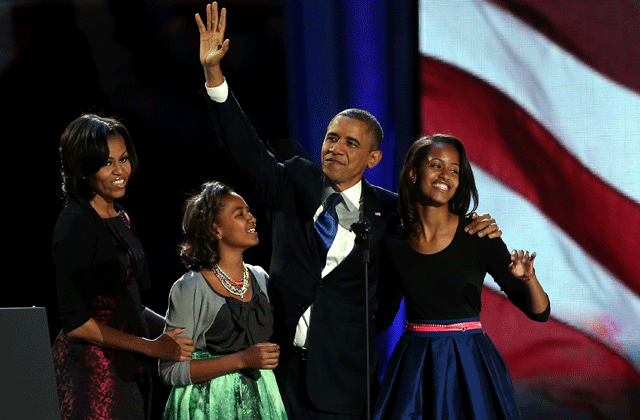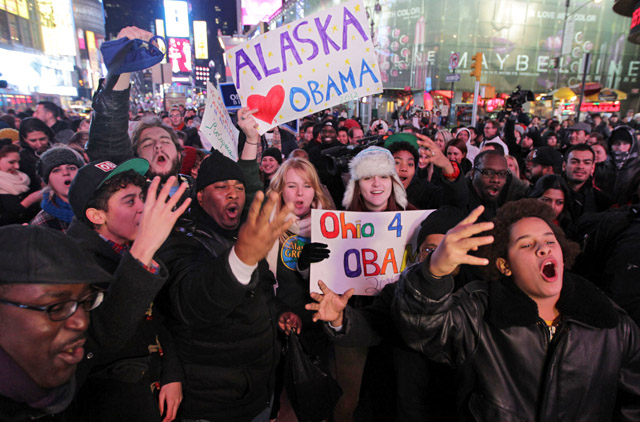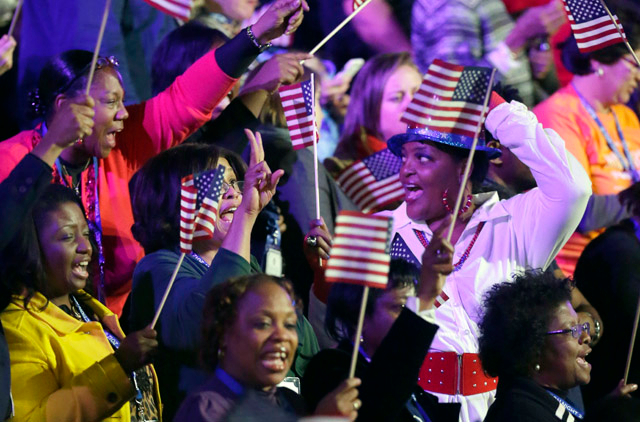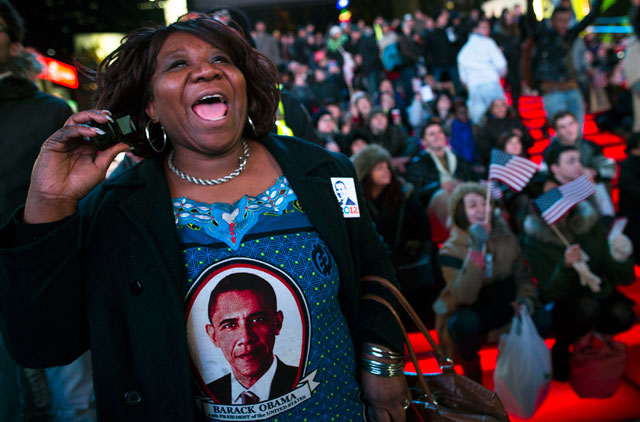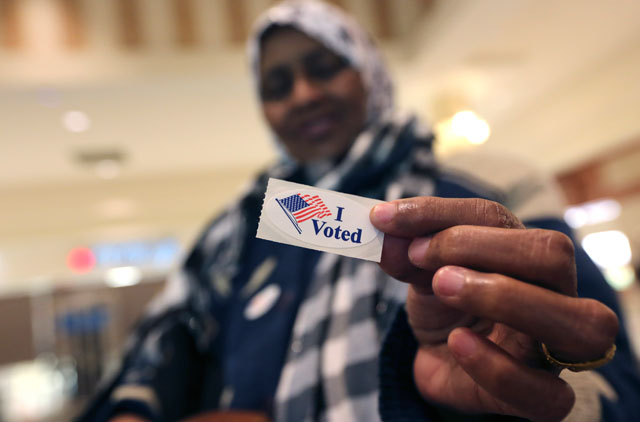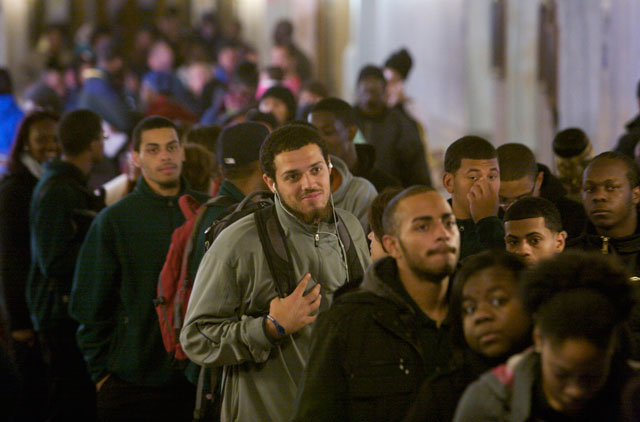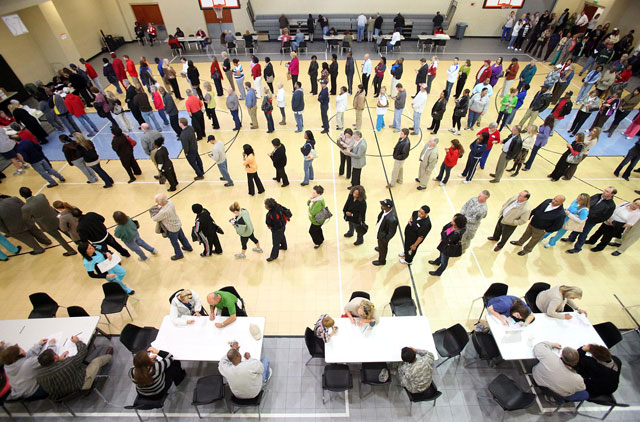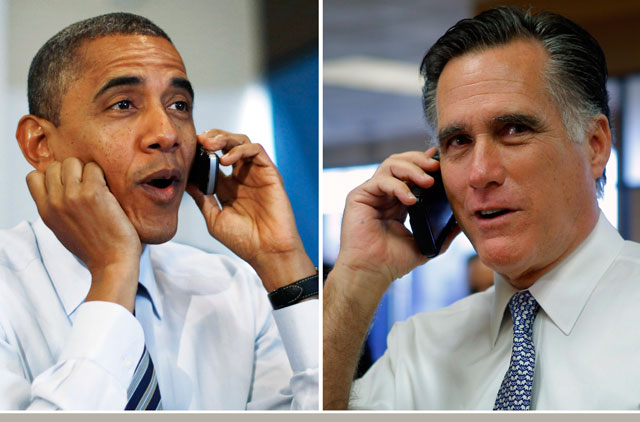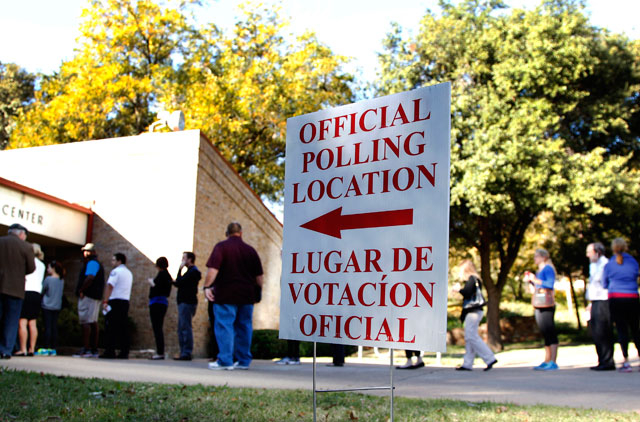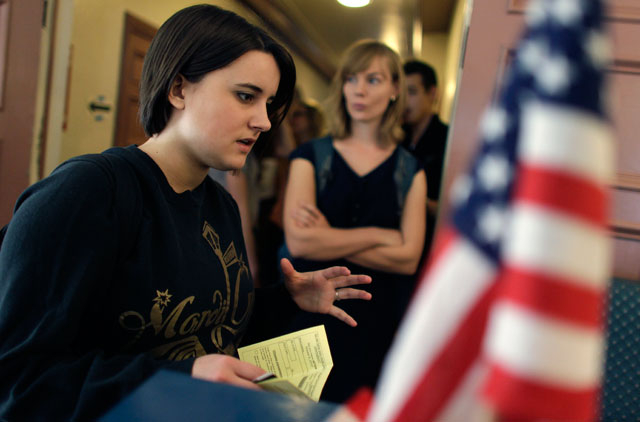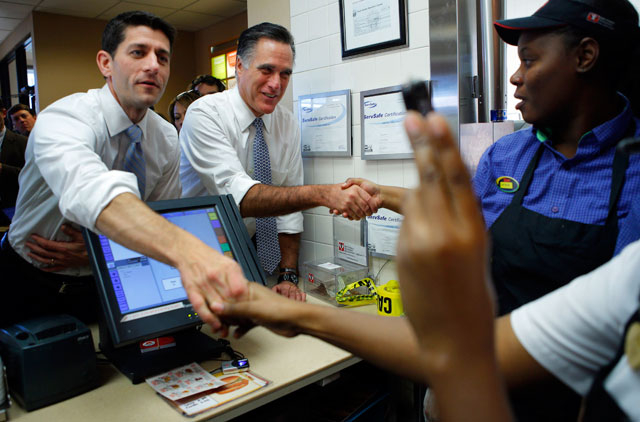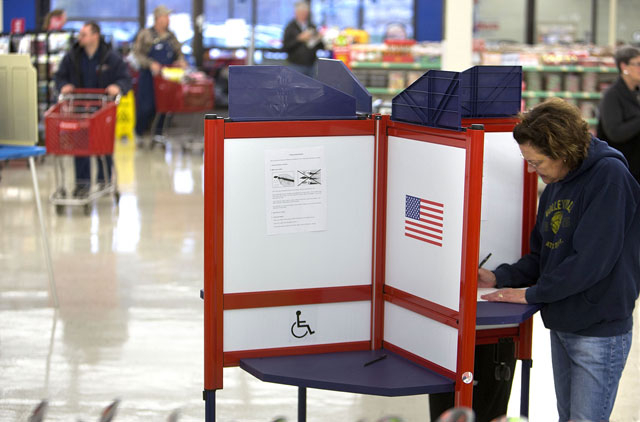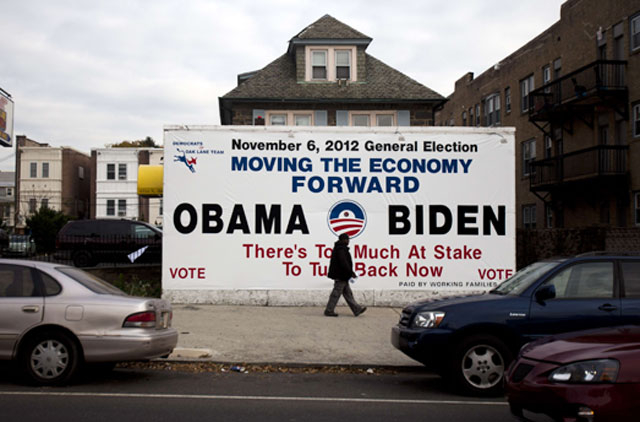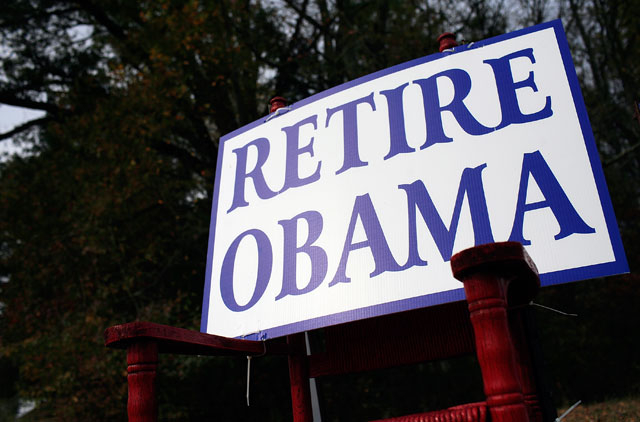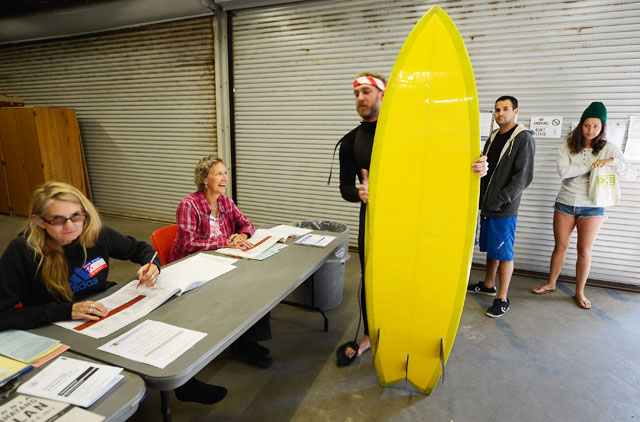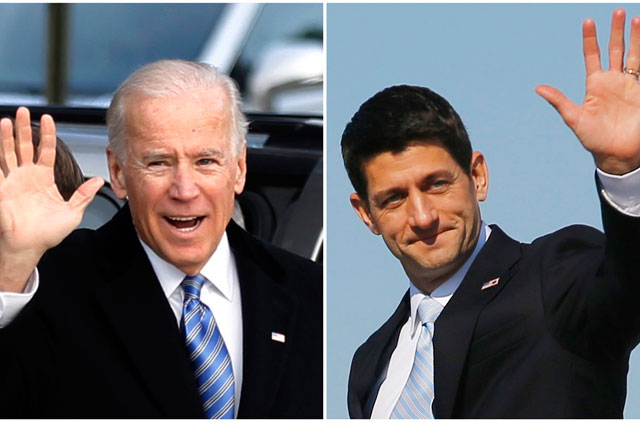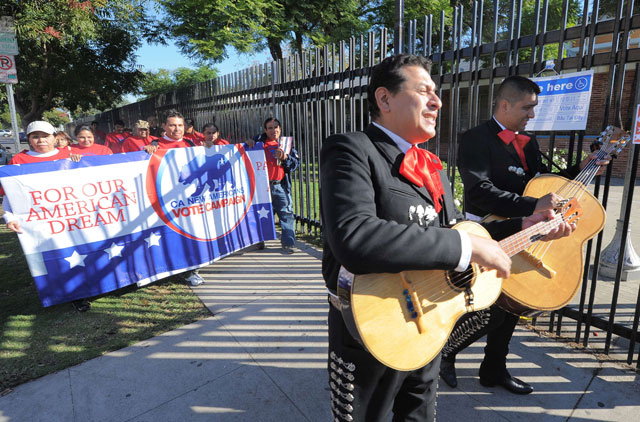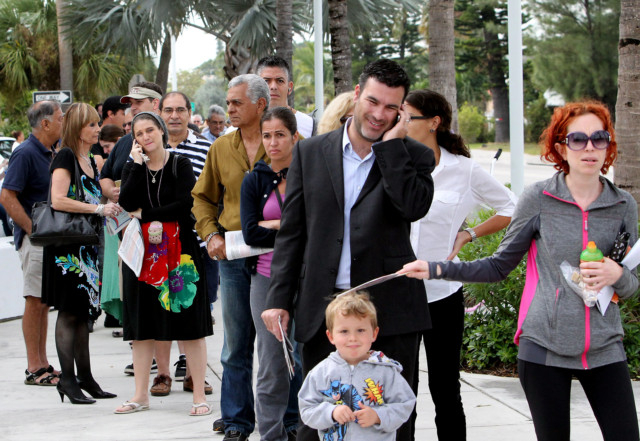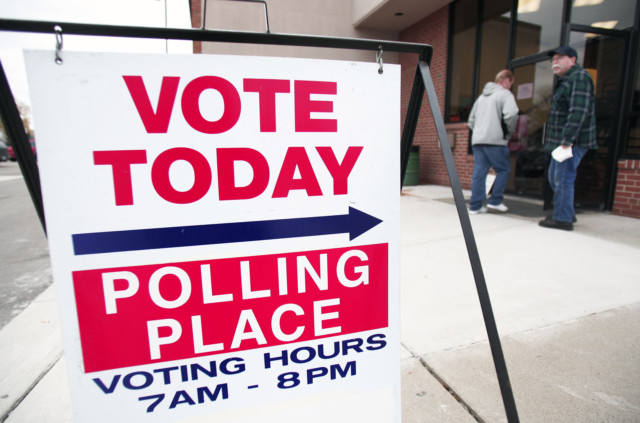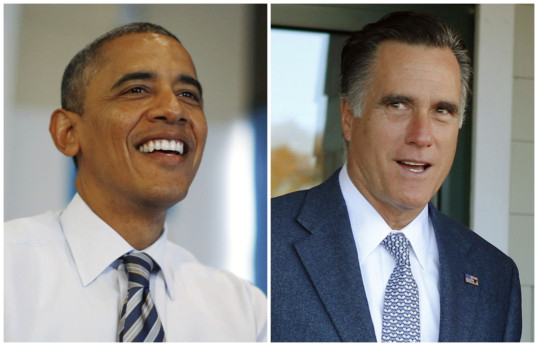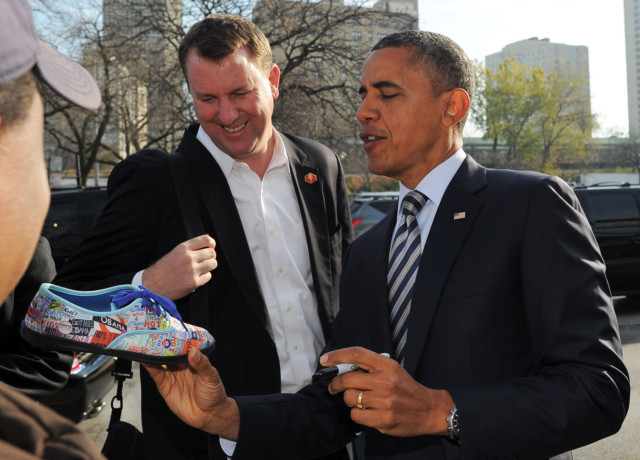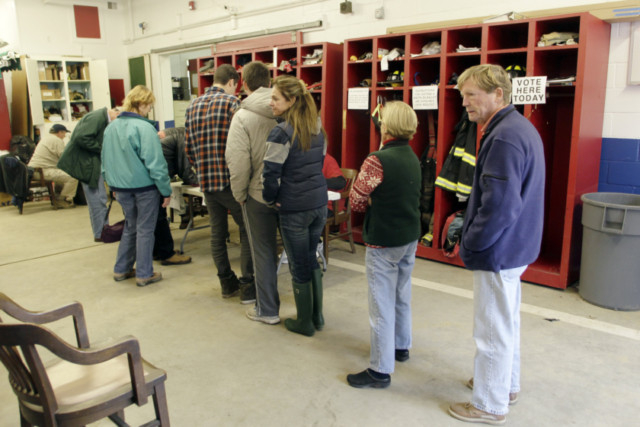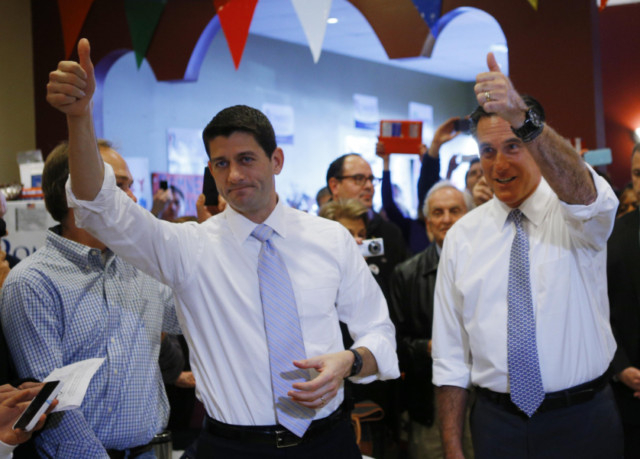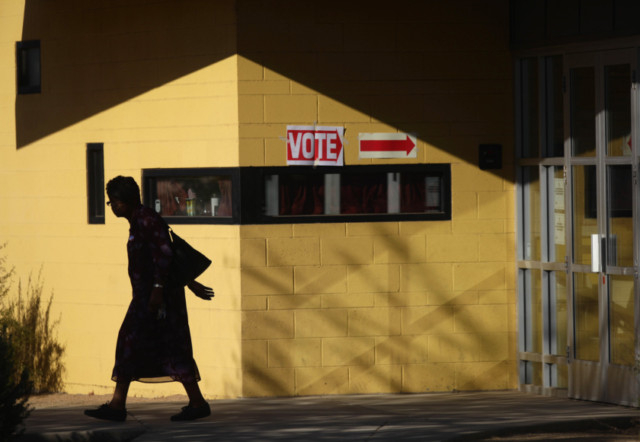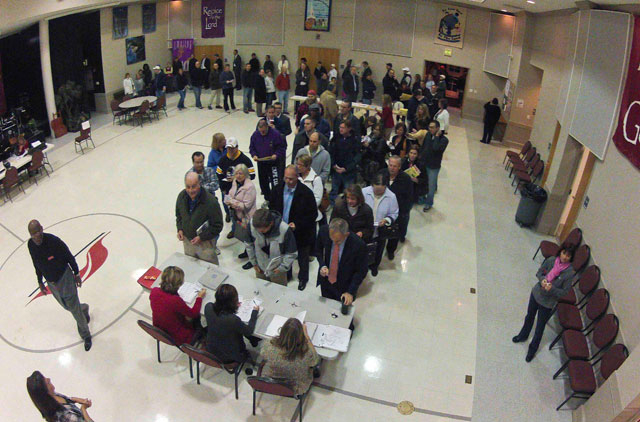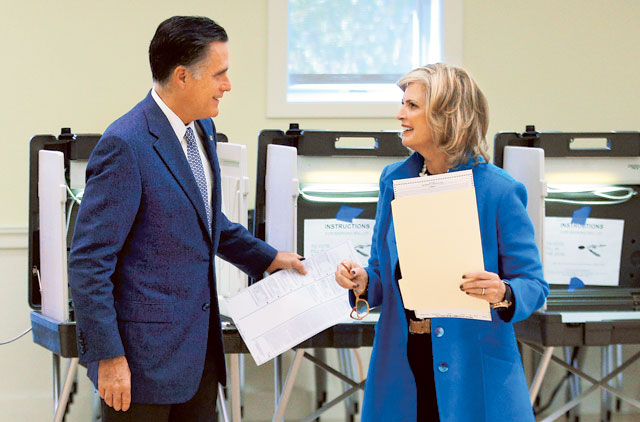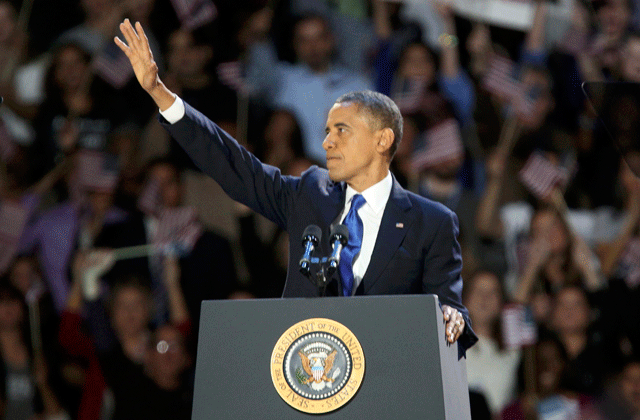
Washington: Growing optimism about the economy and a big turnout of the core Democratic coalition sealed President Barack Obama's re-election victory.
After years of bleak economic news, enough Americans now believe better days lie ahead for the U.S. economy. The coalition of young, female and minority voters that propelled Obama to victory four years ago also turned out again, in huge numbers.
Early exit polls reflected a pro-Obama turnout by minorities and single women so big that in some key states it exceeded numbers seen during his historic election in 2008 as America's first black president.
Although Republican Mitt Romney did much better with independent voters than Obama on Tuesday, that advantage was wiped out in key battleground states by an enthusiasm Obama managed to engender among his core coalition that many analysts were writing off just a few months ago as dispirited and fractured.
In Pennsylvania, for example, African-American turnout exceeded 2008 levels, ABC News said. In Nevada, 18 percent of the voters were Latino - up from 15 percent in 2008, according to CNN.
That rapidly growing electoral bloc backed Obama overwhelmingly, as it appeared to be doing in Florida, one of the biggest prizes with its 29 electoral college votes. By Tuesday night, Florida - a state Romney had been confident of winning - was too close to call, but appeared to be heading toward an Obama victory.
Obama also opened up a large gender gap over Romney among women, several exit polls indicated.
"I thought four years ago there was an enduring Obama electorate, and that is what we've seen tonight," said Tad Devine, a veteran Democratic strategist.
"It's made up of African-Americans, Latinos, single women and young people," he said. "You combine that with blue-collar union workers and upper-educated whites, and you have a majority, especially in battleground states."
Devine added: "This coalition has legs. It reflects the demographic reality of America - the country is becoming less white, and there are more minorities and single people.
Romney also appeared to have overplayed his hand when it came to his central campaign argument that the U.S. economy was in dire straights because of Obama's bungled fiscal stewardship.
In politically divided states such as Virginia, Iowa and Ohio, Romney had an edge among voters who believed he would do a better job handling the economy - but only just. It was not enough for a candidate who made the economy central to his campaign.
As the night wore on, Romney's path to victory narrowed and was all but gone by 10pm EST (7am UAE Wednesday). State after battleground state he needed to win to get to the 270 electoral votes needed for victory fell to Obama: New Hampshire, Iowa, Colorado, Nevada, Wisconsin and Pennsylvania. By 11 p.m. EST, Obama had narrowly carried Ohio - and with it re-election.
Obama effectively swept the American Midwest, the county's industrial heartland.
Romney's efforts to convince voters that America's stubbornly high unemployment rate of 7.9 percent was all Obama's fault appeared to have backfired.
Early national exit polls revealed that about 50 percent of U.S. voters still blamed former Republican President George W. Bush for the country's economic problems rather than Obama.
Bill Galston, a former domestic policy adviser to Democratic President Bill Clinton, said Obama clinched victory because a range of economic factors improved in the past six months.
Galston said the jobless rate had been ticking downward, the housing market appeared to have stabilized with home prices finally rising, and consumer confidence had been improving.
A Reuters/Ipsos poll conducted in the week before the election reflected how voters' views of the economy had been improving steadily.
In October 2011, several months into Romney's candidacy, only one quarter of the country believed America was heading in the "right direction" - a key metric looked at by pollsters and a grave worry then for Obama's strategists.
By last week, that number had risen to 45 percent.
"The president's handling of the economy had to be the centerpiece of Romney's campaign," Galston said. "He had no choice. But all sorts of economic signs perked up in the past six months - and just in time for the president."
Yet Obama's victory in the face of such a high unemployment rate was remarkable given the historical winds he faced. No U.S. president has won re-election with an unemployment rate of over 7.2 percent since Franklin Roosevelt in 1936.
No Republican has ever won the White House without victory in Ohio and the critical swing state was carried by Obama in large part because of his decision early in his presidency to bail out the bankrupt auto industry in neighboring Michigan.
In Ohio, where one in 8 jobs is tied to the auto industry, an overwhelming 59 percent of voters approved of the bailout - a move opposed by Romney at the time. Of that 59 percent, three quarters backed Obama in Ohio on Tuesday.
In Ohio, according to exit polls conducted by CNN, 37 percent of voters believed the economy was getting better, compared with 33 percent who thought things were getting worse.
In Virginia, 43 percent saw things improving, compared with 36 percent who believed life was going to get worse.
In those battleground states, and in others such as Colorado and Iowa, Obama enjoyed significant leads with voters on the question of who would best fight for the middle class and "people like us."
David Gergen, a political analyst and former adviser to two Democratic and two Republican presidents, said: "There is no doubt the president benefited from his economic policies. His auto bailout may have won Ohio and helped win key votes in the upper Midwest."
Gergen added: "Consumer confidence is also on the rise, inspired in part by cheery White House whisperings that success is just around the corner. Voters may have a rude disappointment, but they bought in during this election season."
Here's how the story developed on gulfnews.com:
World leaders offer Obama congratulations
Francois Hollande of France, Angela Merkel of Germany, Egypt's Mohammad Mursi and Russia's Vladimir Putin are among those to have sent their congratulations to Barack Obama on his election win.
The Chinese foreign ministry also sent its congratulations.
Obama declares 'the best is yet to come'
Barack Obama tells crowd in Chicago that he is returning to the White House 'more determined and inspired than ever'.
He declares 'the best is yet to come' for America after congratulating Mitt Romney on his campaign.
He says he is looking forward to working with leaders of both countries to reduce the deficit, fix the tax code and work in immigration.
The re-elected President conclude by saying he has 'never been more hopeful about America'.
Obama wins re-election
Mitt Romney conceded defeat and congratulated Barack Obama for re-election as US president.
Obama, meanwhile, tweeted to supporters, "This happened because of you. Thank you."
With a clutch of swing states, including Florida and Virginia still to be declared, Barack Obama already had more than 290 electoral votes, more than the 270 needed for a White House victory.
There was a sudden explosion of jubilation at Obama's Chicago victory party as Obama booked another four years in the White House.
Mitt Romney led narrowly in the popular vote, by about 30,00 votes out of more than 98 million cast, with ballots counted in 74 per cent of the nation's precincts.
However, Obama's laserlike focus on the battleground states allowed him to run up a sizeable margin in the competition for electoral votes, where it mattered.
He won Ohio, Wisconsin, Virginia, Iowa, New Hampshire, Colorado and Nevada, seven of the nine battlegrounds where the rivals and their allies poured nearly $1 billion into dueling television commercials.
Romney won North Carolina among the battleground states. Florida remained too close to call.
Obama inches toward victory in US vote
US President Barack Obama was inching towards victory on Tuesday as results poured in from the US presidential election, as Mitt Romney's struggled to win vital swing states. An aide to Romney said the presidential contender is not ready to concede.
While the most important trio of battlegrounds - Ohio, Florida and Virginia - remained too close to call, Obama grabbed Wisconsin, Michigan, Pennsylvania and New Hampshire, dramatically shrinking the Republican's chances.
At 0330 GMT (7:30am UAE time), US news network voting projections had Obama leading Romney by 256 to 201 electoral college votes, and the Democratic incumbent appeared to have a far clearer route to victory ahead of him.
As expected, Obama polled strongly in New England and the industrial northeast, grabbing densely populated states like New York, New Jersey, Pennsylvania and Wisconsin, according to news network projections.
His rival Romney did predictably well in the southern Bible Belt and western prairie states, winning the major prize of Texas and taking back Indiana, which Obama won in 2008, for the Republicans.
But Romney failed to win Michigan, his home state where his father served as governor, and the key battleground states of Florida, Virginia, North Carolina and Ohio remained too close to call.
Obama also won New Hampshire, which had been considered a swing state, and Wisconsin, the home state of Romney's running mate Paul Ryan.
Polling was due to have ended in the east of the country, but there were long lines in many areas and officials kept polling centers open late, as the campaigns pleaded with their supporters to stay the course.
The final opinion polls published before voting began showed the two candidates in a dead heat nationwide, but gave Obama a slight advantage in the handful of swing states like Virginia and Ohio that will decide the race.
More than 30 million voters cast early ballots in nearly three dozen states, a reflection of the growing appeal of getting a jump on the traditional Election Day.
Mick O'Reilly, Senior Associate Editor, reporting from Chicago:
Exit polls from states affected by Hurricane Sandy show that President Barack Obama benefited from his handling of the crisis.
Nearly 70 per cent of voters exiting from booths said that his handing of the crisis was positive and influence their vote.
With the first states starting to count their ballots, Republican candidate Mitt Romney looks likely to claim 90 electoral college votes, with President Barack Obama claiming 62 so far.
Obama has picked up the District of Columbia, Maine and Massachusetts, his home state of Illinois and appears to take Pennsylvania. It has 20 college votes.
Nine electoral college votes from South Carolina have been called to Romney, and he's also claimed five from Kentucky. And Romney has just picked up six more votes in Alabama.
Georgia's 16 college votes have been predicted for Romney after the out-polled Obama by a margin of two-to-one. He's also expected to pick up the 38 college votes from Texas.
Polls in Ohio have just closed and Obama has a lead of 200,000 votes so far with 22 per cent of polls closed.
There, the northern industrial cities of Toledo, Akron, Columbus and Cleveland will likely go Obama's way, with the southern rural area going to Romney.
North Carolina is considered too close to call.
It's still a long way to go as 270 electoral college votes are needed to win -- and early indications show this will be a long night.
Polling has closed in the key swing state of Virginia, holding 13 votes. The state is too close too call, with Obama holding a slight edge in the northern suburbs close to Washington, while Romney is claiming the rural south.
A spokesman for the president's campaign said that having so many states too close to call was not a disappointment, and that the results bode well for Obama.
And Florida is also extremely close but the president has a 50-49 per cent lead with 46 per cent of the vote counted there. But 3 per cent of the total votes cast may be challenged over new rules challenging voting identities and signatures.
There are reports too that some voters there had to queue for three or four hours before being able to cast their ballots. A request to extend voting hours there was denied by the state's Republican governor.
The 11 electoral votes in Indiana have gone to Romney. He has aslo claimed Oklahoma.
Obama spent Tuesday relaxing at his Chicago home and playing a game of pickup basketball, while Romney spent the day in Boston consulting with senior party aides.
More early voters choose Obama in Ohio: exit poll
About 60 per cent of early voters in the swing state of Ohio chose President Barack Obama, while more than half of Ohioans voting on Election Day supported Republican challenger Mitt Romney, according to the latest Reuters/Ipsos exit poll.
Ohio is among a handful of states that could swing to either candidate in Tuesday's presidential election.
The exit poll by Reuters/Ipsos says first-time voters choose Obama by a two-to-one margin.
CNN's exit polls in Indiana shows Romney getting an estimated 55 per cent of the vote, while Obama received 43 per cent. In Virginia, exit polls show Romney and Obama tied at 49 per cent. CNN said that its exit polls are estimates taken from voters who have just left polling stations.
Romney predicts victory
Mitt Romney said on Tuesday he is intellectually and emotionally convinced he will win the White House, and has penned an 1,118-word victory speech he hopes to unveil on election night.
Sharing the confidence that his campaign team has publicly exuded for weeks, despite polls showing he has an uphill climb to clinch key battleground states, the Republican nominee said he turned introspective on his final swing of an 18-month campaign.
"Intellectually I felt that we're going to win this, and I've felt that for some time," Romney said in his first comments to reporters aboard his campaign plane in more than a month.
"I just finished writing a victory speech, it's about 1,118 words, and I'm sure it will change before I finish because I haven't passed it around to my family and friends and advisers to get their reaction."
Vote glitch reports pile up in US election
Some computer problems, as well as human ones, drew complaints across the United States as millions of Americans went to the polls.
One Pennsylvania voter highlighted a problem with voting machines on YouTube, complete with video, in which a touchscreen changed his choice from President Barack Obama to Republican Mitt Romney.
"I initially selected Obama but Romney was highlighted," the man wrote. "I assumed it was being picky so I deselected Romney and tried Obama again, this time more carefully, and still got Romney."
In Ohio, some Republicans claimed machines were changing Romney votes to Obama, while Democrats accused Republican state officials of installing untested "experimental" software at the last minute.
Some voting machines were malfunctioning in parts of the Cleveland area, said The Plain Dealer, which quoted election officials as saying ballots would be counted even if scanning machines were down.
In New Jersey, a late decision to allow voters displaced by superstorm Sandy to cast ballots by email caused confusion and frustration.
"Oh no! email box for Essex County Clerk's box is full. No one can email in their ballots," said a tweet from one resident. Betsy Morais, a writer for The New Yorker, found similar glitches. Her email bounced back.
Another source of confusion was a last-minute modification, hours before polls opened, stipulating that voters needed to mail in paper ballots as a verification of the email vote.
In Benton County, Arkansas, officials ran out of paper ballots, local television reported. Voters, who normally have an option to vote electronically or on paper, only had the e-vote option.
An "election protection hotline" set up up the lawyers' committee said voters complained of "chaos" in some Florida precincts, with waits of up to five hours.
In Palm Beach County, Florida, epicenter of the 2000 punch card debacle, local television reported voting was delayed by a printing machine malfunction.
Elsewhere in Florida, the Tampa Bay Times reported that hundreds of voters received automated "robo-calls" telling them the election was Wednesday.
An official told the paper a glitch in the phone system allowed the calls to go through early Tuesday, telling voters the election was "tomorrow." A similar glitch was reported in the US capital city Washington.
The Arizona Republic reported that robo-calls directed voters to the wrong polling stations, and that Democrats claimed it was an intentional effort by Republicans to misdirect people amid a tight Senate race.
First polls close in US election
The first polls closed on Tuesday, with most of Indiana and the eastern part of Kentucky delivering their verdicts in Obama's fight for another term.
Polls closed at 6pm (2300 GMT) in parts of the two states observing Eastern Standard Time. Indiana and Kentucky both straddle two time zones.
Turnout appears high in many parts of the US
Turnout appears to be high in many parts of the country, with long waits at some polling places as voters deliver their Election Day verdict.
A robust turnout among minorities would favour Barack Obama, while Mitt Romney is looking for a strong showing among working-class white men.
Several storm-ravaged areas of New York and New Jersey and several swing states are reporting heavy turnout. The reports of heavy turnout were a relief for officials in the storm-ravaged areas who feared Superstorm Sandy might keep people from the polls.
More than 131 million people turned out to vote for president in 2008, shattering all previous records. This year, more than 32 million people voted before Election Day, either by mail or in person.
New Jersey extends online voting
Residents displaced by superstorm Sandy can vote until Friday, following New Jersey's move to extend online voting, according to reports. Voters need to apply and get approved that they are displaced or unable to vote. Those who get approval will have until Friday to vote online.
Storm-weary voters in US Northeast face delays
Storm-weary residents across the New York and New Jersey area encountered confusion and long lines as they went to cast ballots in the presidential election on Tuesday, and regional officials began scrambling to prepare for a new weather threat due as early as Wednesday.
With the wounds of superstorm Sandy still far from healed and nearly 900,000 households and businesses still without power, officials began ordering closures and evacuations ahead of a powerful nor'easter that could lash the region with 95-km-per-hour winds and a mix of rain and snow as temperatures drop toward the freezing mark or below.
New York Mayor Michael Bloomberg ordered all city parks and beaches closed at noon on Wednesday for at least 24 hours.
In the town of Brick on the New Jersey shore, local officials issued a mandatory evacuation order for waterfront neighbourhoods. Residents of those areas were told to leave. Several nearby lakes were drained to ease the flooding risk.
Tiny northeast town casts first votes
Residents of the tiny northeastern town of Dixville Notch cast the first ballots of the White House race on Tuesday, with Barack Obama and Mitt Romney each receiving five votes.
The first-in-the-nation vote, held shortly after midnight, was tied for the first time in its history, another indication of the knife’s edge separating the two candidates in a race that should be decided by the end of the day.
Tanner Tillotson, 24, who cast the first ballot at 12am (0500 GMT), said he voted for President Obama.
“I think [the result] is very indicative, that this is the first time in Dixville Notch’s history that there is a tie. We’re still a very divided nation and it will be interesting to see how the rest of the country is.”
US expat voter turnout strong in UAE: official
American officials said advance voting by US expatriates living in the UAE ahead of Tuesday’s election was extremely healthy as expats in the hundreds returned absentee ballots to the US with the help of the Embassy in Abu Dhabi and Consulate in Dubai.
The actual number of expatriate ballots cast ahead of the election day on Tuesday is not known because absentee ballots are sent to each expat’s home state for counting before the end of election day.
One official told Gulf News that expatriates were invited to drop off their ballots at diplomatic missions in the UAE to be sent free of charge back to the US for inclusion in the overall election. Read full story
Steady stream of US voters have their say
Bundled up against the sub-zero temperatures, Rachel Santiago emerged from a polling station on Wacker Drive here.
“Four more years,” the 38-year old secretary beamed as she made her way to work at a city law firm. “Barack Obama is great for this city and he looks after working people. If Mitt Romney gets the White House, the only ones he will look after are those with money. Four more years!”
Santiago, like the other 168 million eligible voters across America, has listened to months of arguments, debates, negative and positive advertisements and campaigns carefully plotted by Democrat and Republican spin doctors and pollsters.
Now, it’s Santiago’s turn to have a say.
Mike Polowski abandoned his truck, ran inside, exercised his franchised and ran out to find a Chicao Police officer hovering near the heavyduty pickup with a parking ticket.
“Obama!” he said. “Obama all the way,” then turned to plead his case to the cop.
This city is Obama’s home turf and he represented the state in the US Senate. Elsewhere, across this land, it’s neck and neck.
According to the latest and last poll by USA Today, the president and Mormon millionaire contender Mitt Romney are running in a dead heat – each with 48 per cent of voter support in key swing states. And that is where this election will come down to.
To gain the key to the White House, 270 electoral college votes are required. Both candidates are basically guaranteed between 210 and 220 votes each from support in states where the results are a given – the result hangs on states like Ohio, Florida and Virginia where both campaigns have focused time, money and resources to woo voters.
The central issue in this campaign has been jobs – how to keep them and how to create them. Every year, just to maintain employment, the US economy has to create 270,000 new jobs each year. Under Obama, the economy has backfired and spluttered, with the unemployment rate remaining close to 8 per cent.
Romney is pledging to do better, by giving tax incentives to the wealthy and cutting red tape.
“I’m voting for Romney,” John Morrey, a beverage distributor from Reno, Nevada, told Gulf News. “I employ 53 people. If Obama gets back in, I will have to lay some of those off to get staff down to under 50 so I won’t have to comply with Obama’s medicare proposals. I have never laid anybody off before.”
In New Jersey, where Hurricane Sandy ripped ashore nine days ago, voters made their way to polling states, some powered by generators in the worst-hit areas. There, the power has been largely restored, more than half of its damaged schools reopened and life is slowly returning to normal. How the federal government and the president responded to the disaster will likely have a huge say in the outcome up and down the US East Coast.
With inputs from Mick O’Reilly, Senior Associate Editor; Derek Baldwin, Staff Reporter; and agencies


